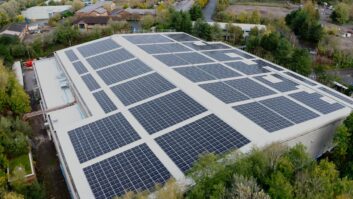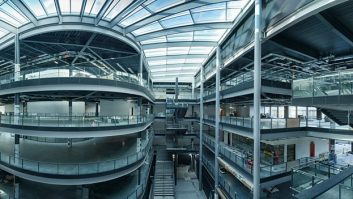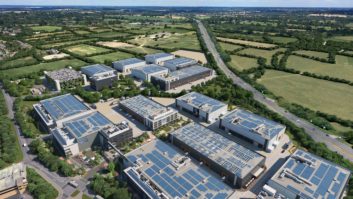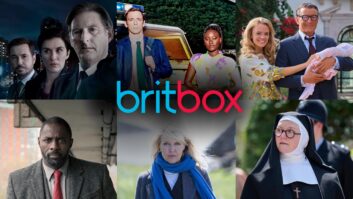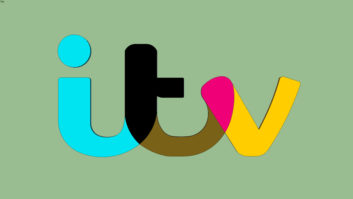This month marks one year since numerous UK broadcasters and streaming services signed the Content Climate Pledge at Cop26.
As part of the pledge, they agreed to use their content to help audiences understand what tackling climate change might mean for them, as well as inspire and inform sustainable choices.
Prior to Cop26, the BBC announced a target of reaching net zero greenhouse gas emissions by 2030 across the organisation. That target is reflected in the broadcaster’s commercial arm, BBC Studios, which also signed up the Content Climate Pledge.
“Sustainability at the heart of everything we do,” BBC Studios’ head of sustainability Sally Mills tells TVBEurope. “It’s truly embedded in our objectives. It’s in our values. We’ve committed through the Climate Content Pledge that we signed at Cop26 to inform and inspire our audiences in the content we create. And off-screen we are part of the BBC’s targets underpinned by science, so it really is part of everything we do. We’re also aiming for low carbon, high nature strategy where we give more back than we take out.”
A prime example of this was Winterwatch, broadcast in early 2021, which was the first outside broadcast to be powered entirely by green hydrogen fuel and energy saving batteries.
BBC Studios makes over 2,400 hours of production content, not just in the UK, but around the world. Every single one of its productions in the UK measures its carbon footprint via albert before certification. “The point of the certification is to have an action plan to reduce that carbon,” explains Mills. “The Winterwatch OB is a really good example of not just a production measuring its footprint but decreasing its footprint and pioneering new tech to help them do that.”
Technology is key to helping BBC Studios meet its net zero targets, with around 90 per cent of its carbon footprint directly related to its supply chain. “We need to work really closely with our suppliers to make sure they’re on the same journey as us,” explains Mills. “That means looking at working with them not just in relation to what their sustainability strategy is, do they have science-based targets, are they looking to decarbonise, but also looking at the products that they supply. How can we innovate alongside them? How can productions talk to suppliers to find new solutions like the green hydrogen solution to reduce our carbon emissions together?”
- How David Attenborough is pioneering the next ‘breaking wave’ of technology
-
Drones, time-lapse cameras, and rebreather diving technology capture Frozen Planet II
Mills adds that the BBC Studios team is working closely with the suppliers to make sure they can both accurately measure carbon emissions. “We need to ensure the needs of the production on set, on location or at events matches the energy solution as closely and accurately as possible to maximise carbon efficiency, and data is key to that. What we’re working with suppliers at the moment on is getting even more accurate on our data, measuring even more accurately. By right-sizing the solutions to the requirement, we will automatically help each other to reduce carbon. On top of that we’re looking to innovate in our products so it’s not just using diesel generators, it’s using batteries, it’s using green hydrogen, etc.”
Sustainability is also key when BBC Studios is looking to buy kit or amend contracts with current suppliers, explains Mills. “I would say it’s evolving all the time, and it has certainly evolved since we’ve developed our net zero strategy,” she adds. “I think it’s about collaborating. Off the top of my head, BBC Studios has more than 3,000 suppliers, and within that you have some really big suppliers and some really small suppliers, and we recognise that everyone is at different stages on that journey. So it’s about working with our suppliers towards that net zero goal together. It is something that we are talking to our suppliers about all the time.”
So, one year on from signing the Content Climate Pledge, what does Mills feel BBC Studios has achieved? “BBC Studios has some big hitting climate change programmes”, says Mills. “We’ve got Green Planet, which reached over 30 million viewers, and brought plants to life in the audience’s mind. Frozen Planet II was just recently released. We’ve worked to amplify them as well. With Green Planet II we created the Green Planet augmented reality experience in London, which reached over 10,000 people. On Frozen Planet II we worked with Minecraft on Frozen Worlds which has been downloaded in more than 220 countries and is translated into 29 languages so that you can learn through play.”
Other ways the company has highlighted climate action is through embedding messages within its programmes. Most recently, in the run-up to the final episode of Frozen Planet II, that involved a special EastEnders map that showed viewers what London will look like should the capital be flooded. Top Gear has showcased eco fuels, while in BBC Three comedy Ladhood, protagonist Liam is seen going door to door selling solar panels.
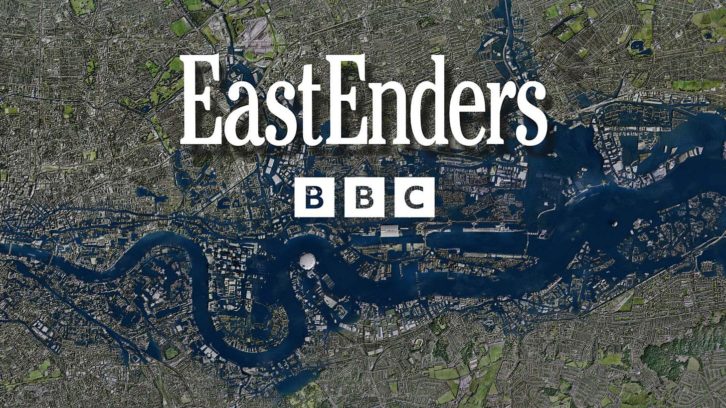
“BBC Studios has also provided briefing packs and shared that information, whether it’s about the technology that people have used or whether it’s about just the nuts and bolts of the science, with our creatives so that they can feel informed and empowered to feed back into the Climate Content Pledge,” adds Mills.
It’s not just production where sustainability is being considered. BBC Studios makes and delivers shows for many international broadcasters. The cloud has helped it significantly reduce its carbon footprint in terms of distributing that content. “It’s about ensuring that where you have material held in the cloud, if those servers and that material is backed by green energy, that’s when you make the transition to reducing the carbon emissions,” explains Mills.
As world leaders gather in Egypt this week for Cop27, Mills says the commitment made last year remains constant. “It’s not just about a moment in time when an event like Cop27 is happening for a couple of weeks,” she adds,” it’s continuous improvement.
“We can’t do this alone. We all have to work together. BBC Studios is working with the BBC, UKTV and the wider media industry to find ever-improved ways of measuring both the reach and the impact of our content on our audiences. If we can crack that nut and find an industry standard, that’s where I think the collaboration will be really powerful. I would say watch this space, we’re still working together on this. Progress has been made not just by individual companies, but across the industry as well.”
